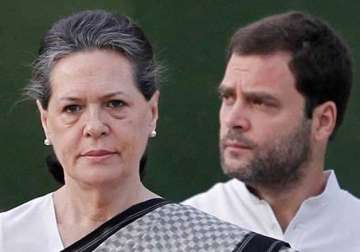Poor leadership casts doubts on Congress recovery
The Congress is in a predicament which is quite unlike that of any other party. It has lost its primacy of position at the national level and is struggling to remain relevant in a number
The Congress is in a predicament which is quite unlike that of any other party. It has lost its primacy of position at the national level and is struggling to remain relevant in a number of states. Even more than these setbacks, which have been the fate of other parties as well - notably of the Bharatiya Janata Party (BJP) which could win only two Lok Sabha seats in 1984 - what is peculiar about the Congress is that there are serious doubts about the capability of its leaders to take the party out of the present political morass.
These misgivings were not there in 1980 or 1984 when the Nehru-Gandhi dynasty's charisma was expected to bring the party back to life, as indeed it did, but the present uncertainties about the Congress leaders cast a shadow on the hopes of recovery.
Since these doubts are being expressed with increasing frequency by outsiders, including apparent well-wishers, there must also be a few in the party who harbour similar feelings. But such is the stifling control exercised by the dynasty that no one is able to articulate his or her concerns on the subject.
On the other hand, since the outsiders are not bound by constraints of politeness or organizational discipline, they have been quite vocal about their views. One of the most acidic has been the historian, Ramachandra Guha, who argues that Rahul Gandhi has "neither the brains nor the heart, nor the physical stamina to be an effective political leader".
Within the Congress, it was only the shock of being reduced to 44 Lok Sabha seats from 206 which made some like T.H. Mustafa, a former minister in Kerala, call Rahul a "joker" and earn a reprimand.
Among others, former M.P. Jagmeet Singh Brar of Punjab asked the Nehru-Gandhis to "take a break from politics and let someone else preside over the Congress". He remained under suspension for a year.
These are however relatively unknown figures, who may have expressed widely prevalent views but whose comments made little impact. Their forthrightness, though suicidal, has not been demonstrated by the better known leaders whose loyalty to the Nehru-Gandhis continues to buttress the party's reputation as an outfit of sycophants.
Perhaps the most servile of them is A.K. Antony, who was handpicked by Sonia Gandhi to conduct an inquiry into the electoral debacle and predictably gave a clean chit to the mother and son.
Notwithstanding this reluctance to turn the spotlight inwards, the fact that there is a faint realization in the party that all is not well, particularly with regard to Rahul Gandhi, is evident from the continuing postponement of the date of his coronation as party president.
He may still make it because of the cheerleaders led by his mother. But there will be uneasiness about his possible gaffes. That he lacks his father's and grandmother's charisma is no secret. Even his sister is considered better qualified by a large number of Congressmen. But a son is always more prized in Indian families than the daughter.
Rahul Gandhi's Achilles heel lies in his temperament of a loner, which is made worse by an innate hauteur as a result of being born with a silver spoon. He is, therefore, unable to interact closely with the leaders of other parties, especially seniors like Sharad Pawar and Lalu Prasad. This inability is a major disadvantage at a time when, as the Bihar results show, the Congress has to function as a partner, even a junior partner, of anti-BJP alliances in the foreseeable future.
Ironically, the faint signs of life that the Congress has shown in Bihar and in the local elections in Gujarat, Karnataka and Chhattisgarh may persuade the mother and son that the debacle of 2014 was an accident caused by a failure to communicate the Manmohan Singh government's achievements. The duo may also come to believe that the marginal revival of the party's fortune signifies a popular approval of their disruptive tactics in parliament.
In this atmosphere of make-believe, the dynasty is likely to tighten its grip on the party, scotching any possibility of new leaders coming to the fore who are not beholden to the first family. Yet, the setbacks suffered by the BJP in the recent elections have nothing to do with a renewal of popular faith in the dynasty, but with dissatisfaction with Narendra Modi for his failure to fulfil his developmental promise.
That the Congress is not oblivious of the connection between growth and political success is evident from its stalling of the government's pro-reform measures lest they lead to economic buoyancy and spoil the Congress's chances.
It is possible that the Congress will continue to do reasonably well in some of the coming elections as a combination of anti-incumbency and slow development affects the BJP's prospects. But the resultant strengthening of the control of leaders of indifferent calibre on the Congress will not bode well for the party.
IANS
